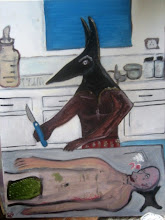Over the years, I have seen a lot of ways of dealing with death - some of these have not seemed to me to be helpful. Not only that, I have met plenty of people who carry the long term, still open, scars that they just can't seem to resolve; from deaths that they were not allowed to acknowledge fully as important emotional events.
The British 'stiff-upper-lip' is a case in point. Often I have watched throughout the post-death period - the removal of the deceased from home; family visits to the chapel of rest - and then, while sitting at the back of funeral services as an observer of the unfolding ritual, I have watched those closest to the person in the box, trying all the time to hold it together. Later hearing things said like "I didn't cry - I kept strong for the children", or "I didn't show myself up by crying". It's not only the public grief that was being pushed aside - it was seen as something to be avoided even in private places; within the family and home.
I ask this question....If we feel that we can't cry when our child dies, If we can't cry when our parent dies, If we can't cry when our spouse of 50 years dies; when can we cry?
Grief is sometime seen as a negative emotion - something to be avoided, negated and pushed away. This clip from a very wise man is a how I believe human beings can heal in cases of 'Death Loss and Palliative Care'.
The quotation marks are there because that's what my BA degree is in......actually, we don't need to do a degree in order to realise that the truth is often very simple.
What we need to do, I think, is to remind people that they do not need permission to grieve......
Subscribe to:
Post Comments (Atom)


4 comments:
thank you so much for this... it was great to watch
Indeed. Very wise words from Mooji. Thank you for the clip. And for you thoughts also
I wonder if we are on a cultural cusp here. We express so much more emotion than we used to in other areas. Men hug each other. Studio audiences express exactly what they're feeling. Where people turn to religion, it's to the expressive evangelical sects rather than the stiff-upper-lip C of E. I could go on.
I think it'll happen soon with grief. Of course, we need to get away from this bereavement counselling idea that grief is a problem to be worked through therapeutically under the guidance of an expert. Socially, people in grief are still regarded as a nuisance and bystanders still feel powerless. There are no protocols for engagement.
At a funeral I led on Friday, as I pressed the button for the committal and the coffin began to descend, all sorts of people called out "See yer, Richard!" and suchlike. That was a development in the right direction.
interesting blog....
as a nurse for 24 years the only way of dealing with death is to live a little/....
Post a Comment